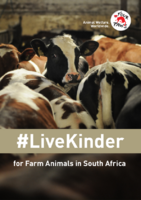
World Farm Animals Day: SA should ring in the reforms
World Farm Animals Day, bringing awareness to the mistreatment of farm animals.
Note: Any advertisements that may appear during the viewing of this video are unrelated to FOUR PAWS. We assume no liability for this content.
World Farm Animals Day, which falls on the 2nd of October every year, has great significance as it bring awareness to the mistreatment of farm animals.
This day also aims to introduce regulations, change laws or a mindset to fight for the welfare of all farm animals.
The Campaigns Officer at FOUR PAWS in South Africa, Bertha Moteane, says some countries are already moving away from intensive animal agriculture. These countries have passed laws which ban cruel practices used on factory farms.
Cows, chickens, pigs, sheep, lambs, and goats are among the farm animals bred intensively in South Africa for human consumption.
Bertha believes the country’s policy makers should amend policy to improve farm animal welfare. It is of a real concern to her that there is a shortage of suitable laws to safeguard, regulate and good welfare practices on farms.
As an example, she cites existing subsidies and policies of the South African government such as the Poultry Master Plan which aims to expand local production and drive domestic demand as well as exports of poultry.
Statistics show at present, over one billion chickens are killed for food every year in South Africa.
“The intensive farming system does not only have negative impacts on animals. It also has devastating impacts on humans and the planet. Reducing this way of farming will have a positive impact on environmental, animal, and human welfare.”
Such a viewpoint supports the One Welfare concept which compliments the One Health approach addressing the interconnectedness between humans, animals, and the planet.
She points out that the rapidly increasing demand for livestock products has led to an increase in production.
These methods have led to the inhumane treatment of farm animals, such as keeping them in confined and overcrowded spaces. Other cruelty practices include routine amputations and mutilations (including debeaking, dehorning, tail docking, castration and others) often without any anaesthetic and analgesia, and cruel and inhumane slaughter methods. It has also created environmental problems such as the over-use of scarce land and water, and an increase in greenhouse gas emissions.
Research indicates that globally, meat production contributes between 14.5% and 51% of global greenhouse gas emissions which constitutes it a primary driver of climate change.
Bertha emphasises that South Africa is already a water scarce country. The fact that factory farms use a lot of water in their production is putting even more strain on the country’s water resources.
Factory farming also means a loss of productive land as many hectares are monopolised to grow animal feed to sustain these farms. This leads to deforestation, air and water pollution, and soil contamination.
According to Bertha, animal-friendly animal production faces a number of challenges.
There is a considerable price disparity between animal products from intensive factory farms and those from animal-friendly farms.
As a result of the regulation gap, there is also a substantial amount of inaccurate advertising, labelling, or marketing of products.
She believes this misleads consumers on attributes of products and production methods used. This means products produced under harmful practices get away with being advertised and labelled as sourced ethically.
There is a solution at hand. She calls on the public to join the FOUR PAWS #LiveKinder campaign by basing their decisions on the 3-R’s principles of reduce, refine, and replace.
“By reducing we mean that the public should reduce their consumption of animal-based products or remove them completely. FOUR PAWS recommends consumers should make more plant-based food choices. Refining involves scrutinising food and fashion choices and choosing products that promote better animal welfare. Replace means substituting animal-based products with alternatives.”
It is however not only food choices that matter. Bertha points out that intensive farming can also be all about products for clothes like leather.
“Kinder choices should be made about what is on your plate as well as what to wear.”
She called on the public to also protect farm animals by responding and supporting mobilisation efforts for a better deal for farm animals.
For an overview of the impacts of South Africa’s farm industry on animals, click here to read the FOUR PAWS #LiveKinder for Farm Animals Report.




